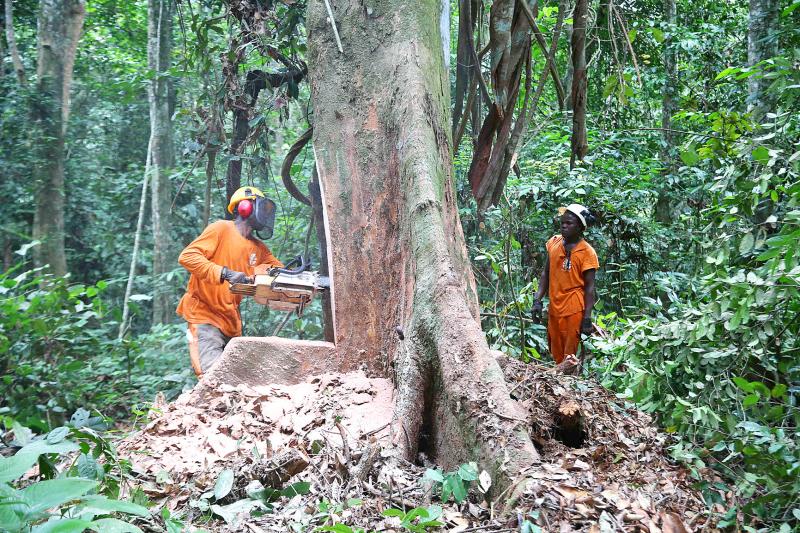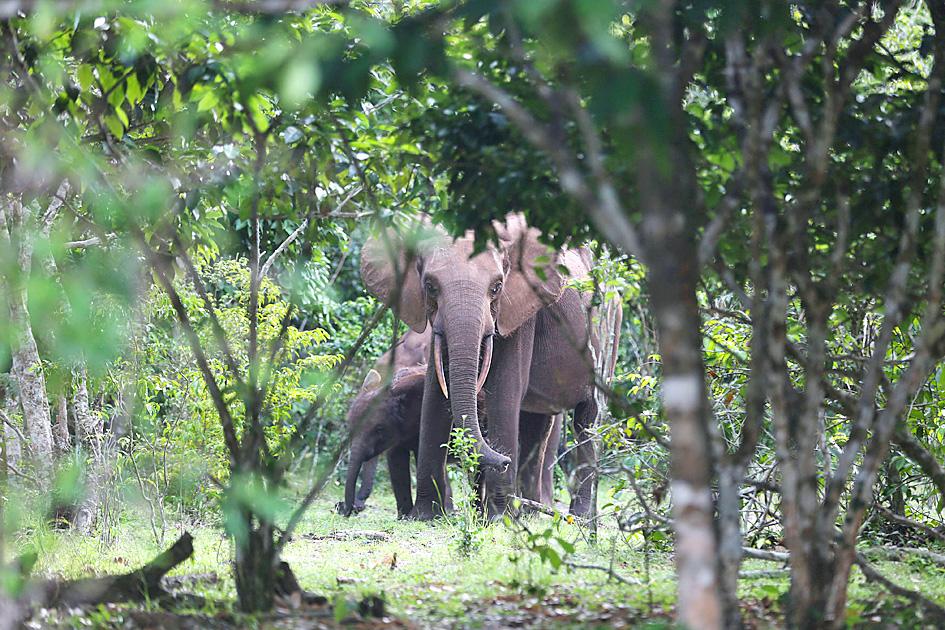A whistle blows. The vehicle stops, and the driver is politely asked to turn off the engine and get out.
A team from Gabon’s anti-poaching brigade then searches the vehicle from top to bottom, looking in every cranny for guns or game.
Nothing is found, and the driver is allowed to move on.

Photo: AFP
The unit’s task is to help guard Gabon’s rich biodiversity.
Forests cover 88 percent of the surface of this small central African nation, providing a haven — and a tourism magnet — for species ranging from tropical hardwoods and plants to panthers, elephants and chimpanzees.
The team was on patrol close to the village of Lastourville, 500km southeast of the capital, Libreville.

Photo: AFP
The area has been badly hit by poaching, and tracks dug into the forest floor by logging vehicles are also used by illegal hunters to enter and shoot game.
“There’s no standard profile of a poacher. Everyone poaches — from the villager who is looking for something to eat to some big guy from the city who has an international network,” brigade commander Jerry Ibala Mayombo said.
The unarmed unit sees its role as “educating, awareness-building and, as a last resort, punishing,” Ibala Mayombo said.
The heaviest sentences are for ivory smuggling, which can carry a 10-year jail term.
The two-year-old service was created by a partnership between the Gabonese of Water, Forests, the Sea and Environment, a Belgian nongovernmental organization called Conservation Justice and a Swiss-Gabonese sustainable forestry firm, Precious Woods CEB.
“At the start, the overall feeling toward us was mistrust, but that’s not the case today, because we have got the message across to people about what we do,” Ibala Mayombo said.
“We sometimes face violent poachers who threaten us, sometimes with their guns,” he said.
The team can be given a police escort when necessary.
Last year, the unit seized 26 weapons and several dozen game items, and arrested eight people for ivory smuggling.
“There is a downward trend,” Ibala Mayombo said.
In the village of Bouma, about 30 local people attended a meeting to promote awareness about hunting restrictions — which species could be hunted, on what dates could they be hunted, which areas banned hunting, how was a permit obtained, and so on.
The mood was tense.
“What can we do when animals invade our fields?” a person asked.
“How can someone tell the difference between a protected species and a [non-protected] one when they’re hunting at night?” another person asked.
“I do understand that we have to protect wildlife,” said Leon Ndjanganoye, a man in his 50s.
“But here, in the village, what do we do to live? We hunt,” Ndjanganoye said. “The laws are simply a vexation.”

Kehinde Sanni spends his days smoothing out dents and repainting scratched bumpers in a modest autobody shop in Lagos. He has never left Nigeria, yet he speaks glowingly of Burkina Faso military leader Ibrahim Traore. “Nigeria needs someone like Ibrahim Traore of Burkina Faso. He is doing well for his country,” Sanni said. His admiration is shaped by a steady stream of viral videos, memes and social media posts — many misleading or outright false — portraying Traore as a fearless reformer who defied Western powers and reclaimed his country’s dignity. The Burkinabe strongman swept into power following a coup in September 2022

‘FRAGMENTING’: British politics have for a long time been dominated by the Labor Party and the Tories, but polls suggest that Reform now poses a significant challenge Hard-right upstarts Reform UK snatched a parliamentary seat from British Prime Minister Keir Starmer’s Labor Party yesterday in local elections that dealt a blow to the UK’s two establishment parties. Reform, led by anti-immigrant firebrand Nigel Farage, won the by-election in Runcorn and Helsby in northwest England by just six votes, as it picked up gains in other localities, including one mayoralty. The group’s strong showing continues momentum it built up at last year’s general election and appears to confirm a trend that the UK is entering an era of multi-party politics. “For the movement, for the party it’s a very, very big

ENTERTAINMENT: Rio officials have a history of organizing massive concerts on Copacabana Beach, with Madonna’s show drawing about 1.6 million fans last year Lady Gaga on Saturday night gave a free concert in front of 2 million fans who poured onto Copacabana Beach in Rio de Janeiro for the biggest show of her career. “Tonight, we’re making history... Thank you for making history with me,” Lady Gaga told a screaming crowd. The Mother Monster, as she is known, started the show at about 10:10pm local time with her 2011 song Bloody Mary. Cries of joy rose from the tightly packed fans who sang and danced shoulder-to-shoulder on the vast stretch of sand. Concert organizers said 2.1 million people attended the show. Lady Gaga

SUPPORT: The Australian prime minister promised to back Kyiv against Russia’s invasion, saying: ‘That’s my government’s position. It was yesterday. It still is’ Left-leaning Australian Prime Minister Anthony Albanese yesterday basked in his landslide election win, promising a “disciplined, orderly” government to confront cost-of-living pain and tariff turmoil. People clapped as the 62-year-old and his fiancee, Jodie Haydon, who visited his old inner Sydney haunt, Cafe Italia, surrounded by a crowd of jostling photographers and journalists. Albanese’s Labor Party is on course to win at least 83 seats in the 150-member parliament, partial results showed. Opposition leader Peter Dutton’s conservative Liberal-National coalition had just 38 seats, and other parties 12. Another 17 seats were still in doubt. “We will be a disciplined, orderly